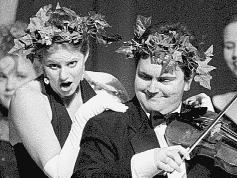A Wide Range
The Opera Theater class scales new heights
by Meghan Howes
|
 |
| A Night at the Operetta, an Opera Theater scenes program on stage in the Music Recital Hall in 1997. |
Devoted Montana opera lovers once traveled to faraway coasts and distant cities to see the real thing performed on stage. But thanks to UM's Opera Theater, professional performance now comes home.
"We're very fortunate not to have to go to Seattle or New York to hear good opera," says Missoula resident Sue Talbot, who has seen many an Opera Theater production over the years. "Those of us who love opera think it's extraordinary that productions of this quality exist in such a small town. There's really nothing else like it."
The Opera Theater treated Talbot and other music lovers to Mozart's Cosi fan tutte last year and staged Britten's Beggar's Opera in 1996. This spring the class works with the drama department to present Kurt Weill and Bertolt Brecht's Three Penny Opera.
"Opera is theater and music combined," says UM Assistant Professor Stephen Kalm, who took over the class in 1994 from its longtime director, Esther England, and changed the name from Opera Workshop to emphasize the marriage of drama and voice. "I want the students to know how important both aspects are to making this form live and flourish. When you're performing operas, you can't just go out on stage and sing."
"You really need the stage experience," says Gretchen Mundinger, a sophomore in voice performance. "You learn how to use props and how to really get your point across--both to the audience and other actors--when singing in foreign languages." Mundinger values the opportunity to explore the behind-the-scenes world of production, learning to paint sets, block scenes and assist in directing.
Because of the ever-changing student body, vocal range, talent and interest vary each semester. Kalm chooses a production to best suit the available voices, usually opting for programs that feature scenes from different operas. "In a full length opera there's usually only one big soprano role," he says. "And I may have seven or eight talented sopranos who really aren't getting any experience singing arias or duets. A scenes program involves more students and allows them to study various roles."
This past fall the Opera Theater presented An American Septet, seven pieces by composers as diverse as Gian-Carlo Menotti and Kurt Weill. At first glance the two composers seem unlikely companions, but Kalm points out that "both the writers were immigrants, the pieces were written in the same year, and they both represent different explorations into the American experience."
Voice student Lynette Badgley highlights another advantage to performing the diverse programs. "Doing these scenes enables the actors to look at so much repertoire," she says.
When the houselights dim in the Montana Theatre for Three Penny Opera, Kalm will see the mutually beneficial marriage between Opera Theater and the drama department. "One of the things I'm proudest of is our collaboration," he says. "We use their designers, and in the fall we'll be doing a scenes program directed by second-year students from the master's program. [Opera] is now part of the directing students' curriculum."
When the late John Lester first assembled the Opera Workshop in 1939, he collaborated with the University Orchestra. When the singers went on tour, the orchestra went with them, a luxury no longer financially feasible. Budget constraints plague the program. "Because the Opera Theater is seen as 'only a class,' it's hard to get funding," Badgley says. The Opera Theater spends between $1,000 and $1,500 to produce a full-scale production, as compared with the drama department's budget of more than double that for a production.
Today the singers, committed to bringing opera to all corners of Montana, tour with only a few musicians. "We're really the main source for operatic entertainment in the state," Kalm says, and he credits community involvement with helping to defray the cost--parents and locals often provide food and lodging for the students, while sponsor fees bring in sorely needed income for each show. Kalm funnels the scant revenue back into the department for future productions.
Although Opera Theater can be a cacophony of details from tour schedules to costume fittings, callbacks to cutbacks, students and professors think it's worth it. "Somehow it all comes together," Kalm says. "You feel like you're really providing a service that people can't get otherwise. It's more than education; it's outreach. That is very satisfying."
Meghan Howes recently earned her M.F.A. in creative writing at UM.


|